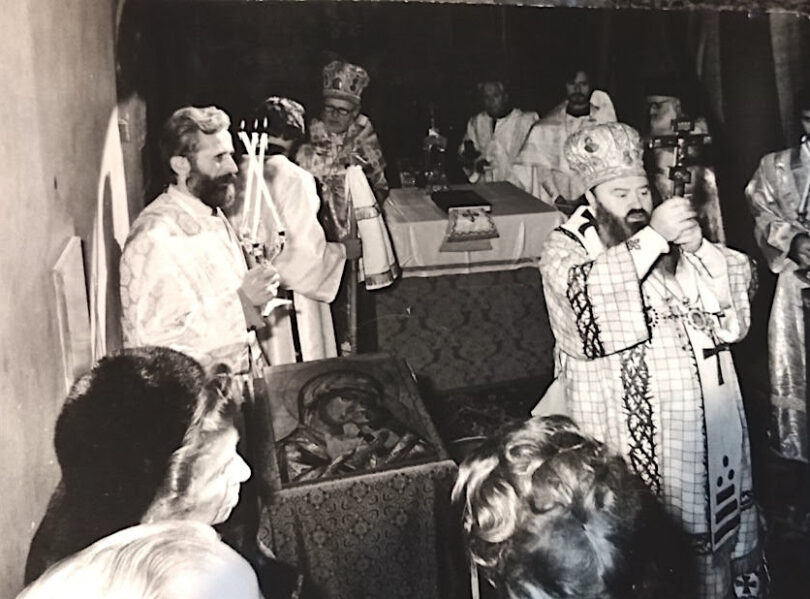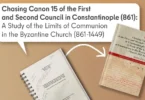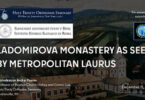On this day in 1969, the Synod of the Russian Orthodox Church adopted a decision to commune Roman Catholics and Old Believers in extraordinary circumstances in the Soviet Union.
This text of the decision contained references to historical precedents. However, as Archbishop Vasilii (Krivoshein) of Brussels recalled, Metropolitan Pimen of Krutitsy (Izvekov, the future Patriarch) pointed out to him that it might have been better to act on a case-by-case basis without turning oikonomia (individual condescension) into a norm – especially since it is impossible to define the boundaries of special circumstances.
Archbishop Vasilii was a white Russian émigré, an Athonite monk and patristics’ scholar who joined the Moscow Patriarchate out of a sense of fidelity to the suffering Russian Church. He understood that the Church in Russia had to walk a fine line. Both Archbishop Vasilii and Metropolitan Anthony of Sourozh (Bloom, another Russian émigré) understood that while they could not judge acts of the Russian Church in captivity, their own existence in the free world requires different attitude. For example, at the Episcopal Conference preceding the 1971 Council of Bishops (in Zagorsk, Russia), Metropolitan Anthony opposed new political statements against “the Karlovite schismatics.”
This 1969 decision had an impact outside of Russia. Archbishop Vasilii did not even attempt to explain it as oikonomia or “Eucharistic hospitality”, as on the photo above. At the same time, the Russian Church Abroad, having accepted “ecclesiastical refugees” fleeing from the Ecumenical Patriarchate because of Ecumenism, had to “report” to them. Therefore, at the Bishop Council in Montreal in 1917, it was decided:
“No matter what attempts Metropolitan Nikodim and other Moscow hierarchs try to make to explain this act, it is completely clear that by this decision communion has been established between the Moscow Patriarchate and Roman Catholics, albeit with certain limitations. Furthermore, the Catholics have already decided to permit children of the Orthodox Church to receive communion from them. This (i.e., the state of communion between the Moscow Patriarchate and Roman Church) was particularly clearly demonstrated in the service held on December 14, 1970, in St. Peter’s basilica in Rome when Metropolitan Nikodim gave communion to Catholic clerics. It is obvious that this act could not be justified by need (i.e., that the Catholics had no churches of their own at which to receive communion).”
As is often the case, one reaction causes another. An unexpected consequence of the Moscow Synod decision was that the 1971 Council of Bishops of the Russian Church Abroad decided to change the practice of receiving non-Orthodox proscribed at the All-Moscow Council of 1666-1667 in favor of the eighteenth-century practice of the Ecumenical Patriarchate:
“Having in mind this circumstance and the growth today of the heresy of ecumenism, which attempts to eradicate completely the distinction between Orthodoxy and all the heresies, so that the Moscow Patriarchate, in violation of the sacred canons, has even issued a resolution permitting Roman Catholics to receive Communion in certain cases, the Council of Bishops recognizes the necessity of introducing a stricter practice, i.e., that baptism be performed on all heretics who come to the Church, excepting only as the necessity arises and with the permission of the bishop, for reasons of economy or pastoral condescension, another practice of reception in the case of certain persons (i.e., the reception into the Church of Roman Catholics and those Protestants who perform their baptism in the name of the Holy Trinity) through the renunciation of their heresy and by chrismation.”
It is not well known that the Russian Church abandoned this 1969 decision about “Eucharistic hospitality” after the death of Metropolitan Nikodim in 1978. However, the practice of receiving converts through baptism became one of the distinguishing characteristics of the Russian Church Abroad.
Sources:
“Resolution of the Council of Bishops of the Russian Orthodox Church Outside of Russia,” Historical Studies of the Russian Church Abroad.
Monk Benjamin, “Letopis’ tserkovnykh sobytii Pravoslavnoi Tserkvi nachinaia s 1917 goda,” [Timeline of the events in the history of the Orthodox Church Beginning with 1917] Part V: 1961-1971, Historical Studies of the Russian Church Abroad.
References:
Archimandrite Amvrosii (Pogodin), “On the Question of the Order of Reception of Persons into the Orthodox Church, Coming to Her from Other Christian Churches,” Historical Studies of the Russian Church Abroad.
Andrei Psarev, “The 19th Canonical Answer of Timothy of Alexandria: On the History of Sacramental Oikonomia,” Historical Studies of the Russian Church Abroad.











